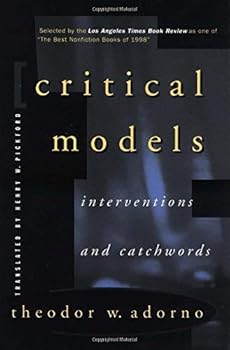Critical Models
Select Format
Select Condition 
Book Overview
"Critical Models" combines into a single volume two of Adorno's most important postwar works -- "Interventions: Nine Critical Models" (1963) and "Catchwords: Critical Models II" (1969). Written after... This description may be from another edition of this product.
Format:Paperback
Language:English
ISBN:0231076355
Release Date:October 1999
Publisher:Columbia University Press
Length:400 Pages
Weight:1.30 lbs.
Dimensions:9.0" x 1.0" x 6.1"
Customer Reviews
2 ratings
A good jumping-off point for neophyte Adorno readers
Published by Thriftbooks.com User , 24 years ago
If you want to understand something about the nature of Adorno's overall project, read the guy below, sadly cut off as he is in mid-sentence. If your only contact with Adorno is the bitter "Minima Moralia" or the (to me) rebarbative "Negative Dialectics", this is an essential complement. If you aren't interested in radical cultural criticism...er, why are you reading this?Critical Models is a collection of essays, articles and radio talks, mostly from quite late in Adorno's career. I am neither a philosopher nor an academic, and would be the first person to admit that I'm not quite up to Adorno's more Hegelian moments. I'm just casting about for help in an increasingly bland, homogenised, uncritical cultural environment, and the best thing about Critical Models is that it's Adorno being unusually _helpful_.This is Adorno throwing himself into the task of trying to build a post-war democracy in Germany, not Adorno the cantankerous emigre complaining that doors shut more violently than they used to. He urges the value of promoting the status of teachers, of rooting out and criticising Nazi attitudes (who'd have thought that they'd still be flourishing fifty years on). Adorno is seldom a very approachable writer, but here he's making the effort to communicate to a mass audience, and to a relatively uneducated schmuck like me it's critical dynamite. The spine of my copy of Negative Dialectics may remain forever uncreased, but this one will be carried around.
Rolling in his grave as he's reviewed ...........
Published by Thriftbooks.com User , 24 years ago
It is important to point out that Teddie Adorno is spinning in his grave, for the very venue on which I am reviewing Critical Models is itself an example of the fetishized, reified and administered world that Adorno named, and critiqued. However, Adorno's philosophical tradition also includes the catchphrase what is, is right, and would probably view the Internet as more or less a necessary consequence of vast economic forces which it would be simple minded to simply ignore, or negate. And, his "dialectical" logic not only permits us to log on and praise him where praise is due: it requires us to do so. This collection is of essays written after Adorno returned to the Federal Republic of Germany in the early 1950s. Because culturally Adorno was "very German" and indeed he resented the *Volkische* definition of Germanness imposed by Hitler, Adorno delayed his escape, as the son of a Jewish father and Catholic mother, from Hitlerdom to a dangerous point. He resided briefly in England and somewhat longer in America. Strangely, he did not like England and (given the choice) preferred America, and specifically California, the latter because of its climate. This collection makes it clear that although Adorno was critical of many tendencies in America he was by no means knee-jerk in his criticism. Adorno enjoyed the very real democracy of American life and the very real empiricism of science as practised here...insofar as democracy and empiricism did not become, as a very different sort of emigre might call it, a shtick, or a number: or, as Adorno would call it, fetishized or reified. But it is clear from these essays that Adorno would be very critical of changes in America that have occured since my generation, that of the immediate post-war Baby Boom, has taken over the shop. Adorno's work on Fascist tendencies in California, for example, located Fascism in our hearts and at our dinner tables. These tendencies are denied in ceremonies (such as the commemoration, last week, of the bombing in Oklahoma City) which are structured by press and lawyers in a way that fully denies anything like a spontaneous response. One naturally wonders why it is that people at these commemorations, which memorialize real pain that should never be repeated, have to act in such structured fashions, and it was the structuring of Timothy McVeigh's life by similar tendencies that caused him, in all probability, to bomb the Murragh building. It was irresponsible to decry social research that located Fascist and authoritarian tendencies so close to home and to expect no incidents such as the bombing of the Oklahoma City building. Adorno's work is a reminder to examine our own environment for barbarism, and Americans who have worked on issues of domestic abuse are in his tradition, even if they would actually find the guy irritating, arrogant and conceited...all of which he was. Some of the book does require, because of Adorno's arrogance, a





